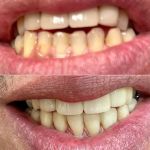Best Treatments for Sensitive Teeth: Effective Solutions to Soothe and Protect Your Smile
- 1. Understanding Sensitive Teeth
- 2. Causes of Sensitive Teeth
- 3. Treatment Options for Sensitive Teeth
- 4. Professional Care and Solutions
- 5. Prevention Tips to Manage Sensitivity
1. Understanding Sensitive Teeth
Sensitive teeth can cause significant discomfort when consuming hot, cold, sweet, or acidic foods. This common dental issue affects millions of people globally. Sensitivity arises when the protective enamel on your teeth wears down, exposing the softer, sensitive inner layer of the tooth called the dentin. Dentin contains microscopic tubules that lead directly to the nerve, making your teeth more sensitive to temperature and other stimuli.
2. Causes of Sensitive Teeth
Several factors can lead to sensitive teeth. Some of the most common causes include:
- Enamel Erosion: Over time, enamel can wear away due to poor oral hygiene or excessive consumption of acidic foods and drinks.
- Gum Recession: Gum recession exposes the tooth roots, which are more sensitive than the crown of the tooth.
- Tooth Grinding: Grinding your teeth can cause damage to the enamel and increase sensitivity.
- Dental Procedures: Certain dental treatments, such as teeth whitening, can temporarily cause sensitivity.
3. Treatment Options for Sensitive Teeth
There are various treatments available to help manage sensitive teeth. These solutions aim to block the transmission of sensations from the tooth surface to the nerve, alleviating discomfort. Some of the most effective treatments include:
3.1 Desensitizing Toothpaste
One of the simplest ways to treat sensitive teeth is by using desensitizing toothpaste. These toothpastes contain compounds that help block the nerve signals responsible for pain. Look for products with fluoride or potassium nitrate, which are proven to provide relief.
3.2 Fluoride Treatment
A fluoride treatment, applied by a dentist, can help strengthen enamel and reduce sensitivity. This treatment is often used to help remineralize weakened areas of the teeth, offering long-term relief.
3.3 Dental Sealants
For more severe cases of sensitivity, dental sealants may be applied to cover the exposed surfaces of your teeth. These sealants protect the dentin and provide a barrier against triggers like hot or cold temperatures.
4. Professional Care and Solutions
If at-home treatments do not provide sufficient relief, it may be necessary to consult with a dentist for more advanced options. Some professional treatments that can help include:
4.1 Bonding
Dental bonding involves applying a tooth-colored resin to sensitive areas of the teeth. This resin creates a protective barrier over the exposed dentin and helps minimize sensitivity.
4.2 Root Canal
If sensitivity is caused by a deep infection in the tooth, a root canal may be necessary to remove the infection and eliminate the source of pain. This is typically considered a last resort when other treatments fail.
5. Prevention Tips to Manage Sensitivity
While treatments can help alleviate the discomfort caused by sensitive teeth, prevention is key to long-term oral health. Here are a few tips to help reduce your risk of developing sensitivity:
- Use a soft-bristled toothbrush and brush gently to avoid wearing down enamel.
- Limit the intake of acidic foods and drinks, such as citrus fruits and soda.
- Practice good oral hygiene by brushing twice a day and flossing daily.
- Visit your dentist regularly for checkups and cleanings to maintain healthy teeth and gums.
If you're struggling with sensitive teeth and need professional guidance or treatment options, consider visiting Dentistry Toothtruth for expert advice and services. Their team can help you find the best solutions tailored to your needs and offer personalized recommendations.







 North Scottsdale Dental4.0 (211 review)
North Scottsdale Dental4.0 (211 review) TK Dental Wayne, NJ | General, Cosmetic, Restorative Dentists. Dental Implants, Crowns, Bridges | Tatyana Kaminar DDS4.0 (139 review)
TK Dental Wayne, NJ | General, Cosmetic, Restorative Dentists. Dental Implants, Crowns, Bridges | Tatyana Kaminar DDS4.0 (139 review) Clark Dental Associates4.0 (10 review)
Clark Dental Associates4.0 (10 review) South Mississippi Smiles - Gulfport4.0 (454 review)
South Mississippi Smiles - Gulfport4.0 (454 review) Abundant Dental Care of Sandy4.0 (399 review)
Abundant Dental Care of Sandy4.0 (399 review) Minnesota Orthodontics - Mendota Heights4.0 (27 review)
Minnesota Orthodontics - Mendota Heights4.0 (27 review) The Importance of Oral Health Education During Pregnancy for a Healthy Pregnancy
The Importance of Oral Health Education During Pregnancy for a Healthy Pregnancy Best Tips for Brushing Your Teeth Properly for Healthy Gums: Essential Techniques for Oral Health
Best Tips for Brushing Your Teeth Properly for Healthy Gums: Essential Techniques for Oral Health Why Skipping Dental Checkups Can Lead to Bigger Oral Health Problems
Why Skipping Dental Checkups Can Lead to Bigger Oral Health Problems Advantages of Porcelain Dental Restorations
Advantages of Porcelain Dental Restorations How Can Diabetes Cause Tooth and Gum Problems? Preventing and Managing Oral Health Issues
How Can Diabetes Cause Tooth and Gum Problems? Preventing and Managing Oral Health Issues Healthy Habits for Promoting Good Oral Health and Hygiene: Tips for a Healthy Smile
Healthy Habits for Promoting Good Oral Health and Hygiene: Tips for a Healthy Smile